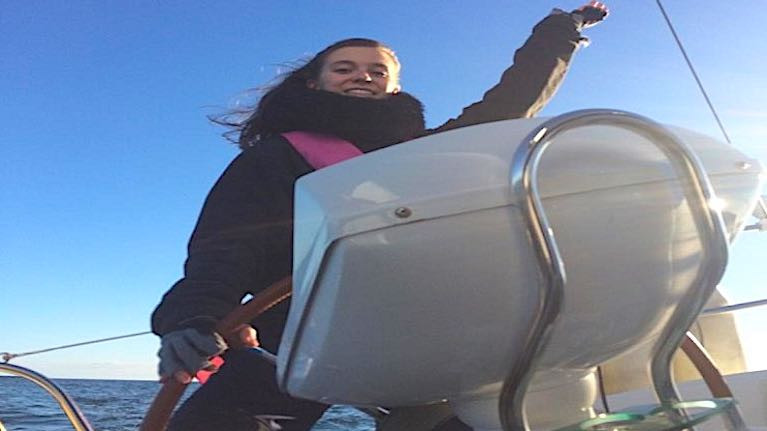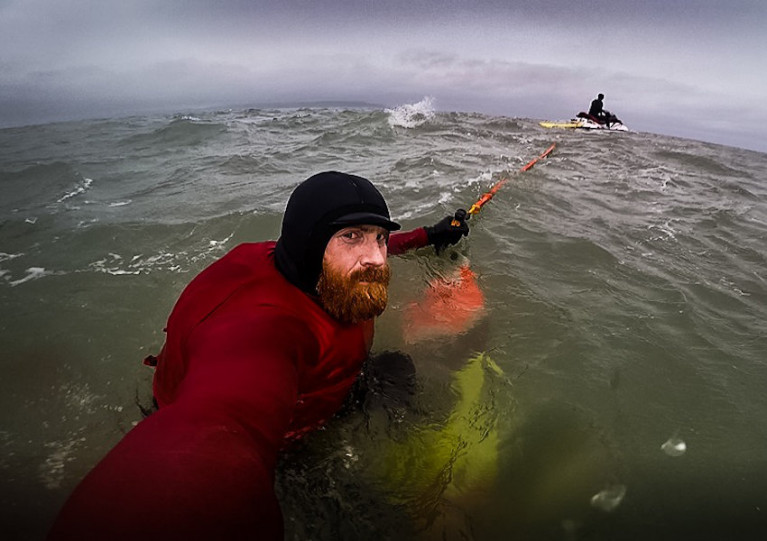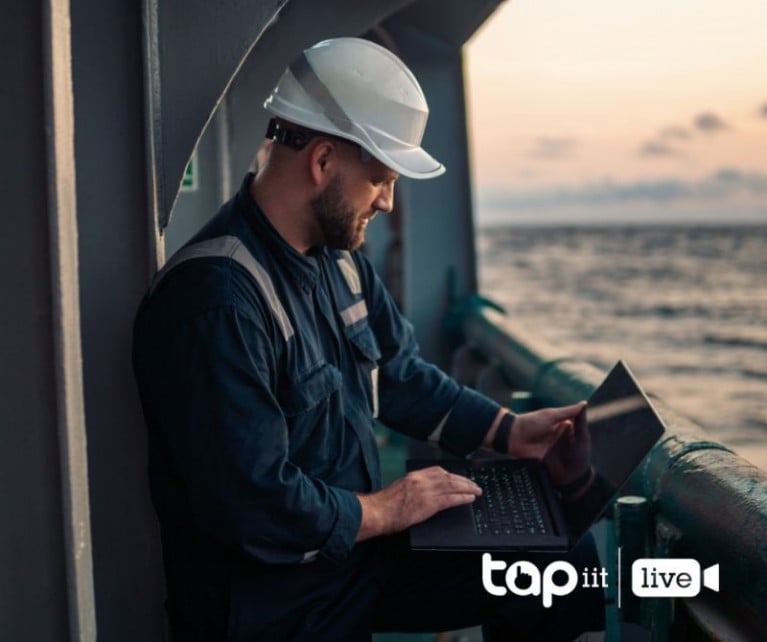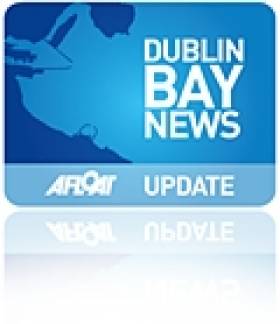Displaying items by tag: mental health
Brent Pope Gives Mental Health Talk to Dublin Port Workers As Part of Irish Port Safety Week
In Dublin Port today Brent Pope, rugby pundit and mental health activist, gave a mental health talk aimed at their workers as part of events held during Irish Port Safety Week.
While last years’ national ports event featured themes such as road safety in the Port, water safety, and machinery, this years’ event is also focussing on wellness, with Pope’s talk being the highlight of the week.
In the last few years there has been a shift to include wellness and mental health in these discussions, as mental wellbeing becomes a more widely discussed topic. The positive emphasis on maintaining mental health has grown in recent years and this event is another example of it becoming more openly addressed.
Pope became involved in the mental health discussion in 2012, following the release of his best-selling autobiography entitled “Brent Pope – If You Really Knew Me” which documented his own mental health struggles throughout his life. In 2018 he released another book about mental health in sport entitled “Win” which he co-wrote with Jason Brennan. He is also the curator of Outside In Art Gallery, a Dublin-based art gallery for mental health artists. Pope is also involved in several mental health charities and is an ambassador for St. Patrick's Hospital's Walk in My Shoes, Cycle Against Suicide, and Rehab's People of the Year Awards.
The talk this morining took place as part of Port Safety Week, which Dublin Port is hosting for the second time following its successful launch in 2021. The week is an opportunity for all Port users to collaborate to improve safety culture in the port sector by sharing experience and knowledge. The calendar of events features a HGV Driving Simulator, the RSA’s road safety interactive unit, known as the Shuttle, fire awareness training, first aid training, with the highlight of the week being Pope’s mental health talk.
Commenting on the event, Pope said, “It is really heartening to see mental health given such emphasis during Port Safety Week. While all the other safety elements being discussed are also of huge importance, looking after your happiness and wellbeing is crucial as well.”
“These workers face unique challenges in their occupation, and I was honoured to be asked here today to hopefully equip them with some tools to tackle these challenges.”
Port Harbour Master Michael McKenna said, “Brent’s talk here today shows how far the conversation on mental health has progressed in recent years. We are delighted to be hosting such an event and helping all of our stakeholders in any way that we can.”
Sailing & The Sea is Therapeutic for Our Mental Health
Lydia Millar, a final year student at Queen's University Belfast, joined the university's sailing club to help improve her mental health.
Describing herself as 'an emotional sponge,' Lydia believes that no matter how cold you may get on a winter sail, nothing warms the soul and puts the ease as much as sailing. She has since become part of a community and gained a sense of belonging, daring others to 'try it' and give sailing a go. She also rows at Belfast Boat Club on the River Lagan.
Lydia says "I got involved in sailing through my dad. When he was a boy, his dad handmade him a boat called Sea Hawk which he sailed at Killyleagh on Strangford Lough. Due to a busy work schedule, he stopped sailing for decades; however, in 2006 we got a cruising yacht and I've been sailing ever since. Last year, I also joined Queen's Sailing Club and we sail Firefly dinghies at Ballyholme Yacht Club".
She admits that she has always been an anxious person and after leaving school her anxiety became a problem affecting day-to-day life. "I had to make the decision to leave my dream university and dream course to come home and reset. At the time, the pressure of fitting a mould, pretending everything was fine and "sucking it up" was too much. I couldn't lie to myself like that".
In her second year at Queen's Lydia joined the Queen's Sailing Club. She remembers being nervous joining but knows it was the best decision.
She continues "Escaping the city and being thrown into a boat with likeminded people did, and continues to do, much for my mental health. First and most importantly, sailing gave me a sense of community and belonging. A group of people all sharing in the freedom that sailing allows is amazing. Secondly, it changed the direction of my focus from inward to outward. Both mind and body are engaged in sailing which can be a welcome distraction, helping to get out of your head. As part of this, you learn to embrace all kinds of weather thrown at you, from sunshine to torrential rain (and sometimes even snow). However, trust me when I say, nothing warms the soul and puts the mind at ease more than a bracing winter's sail followed by a warm shower and cup of tea. Try it, I dare you. The sea is so therapeutic, and the sound of a boat gliding through the water... now that's bliss".
Lydia is convinced that sailing has definitely improved her problem-solving skills as you have to be on the ball for potential mishaps, and when they occur you have to be quick to respond.
The sport has also she says, improved her creativity - trying new things to get better results has helped with her studies and in finding unique ways to answer legal problems.
Sailing gets you into the open air
She concludes " Sailing gets you outside and into the open air, bringing you movement and freedom. And so, if you're feeling stuck or have felt out of sorts or you would just like to challenge yourself with something new, I'd highly recommend getting in touch with your local sailing club and give sailing a go".
The Sport Northern Ireland Sport Wellbeing Hub is a valuable online resource. It was formed in response to the COVID 19 challenge and provides instant access to helpful information, guidance and resources that can be tailored specifically to help care for our wellbeing needs.
More here
Lovers Of Watersports From NI Share Their Tips For Better Mental Health
Northern Ireland surfer Al Mennie says conquering some of the world’s biggest waves has helped in managing his mental health.
In the run-up to World Mental Health Day yesterday, Saturday 10 October, Mennie told UTV News how his preparation for taking on the giant swells at Nazaré and other big wave spots as given him “a really good understanding of anxiety and fear”.
And he’s also benefitted from putting his thoughts and concerns into writing, even publishing a book about his experiences.
“So, for men who don’t want to talk, I think this is a good piece of advice — if you can write stuff down and get it out of your system, it’s a great way of dealing with whatever you’re going through.
“And that might actually open the door to you then going and speaking to somebody.”
Getting into the great outdoors has also been beneficial to Lydia Millar, a final-year law student at Queen’s University Belfast who joined her university’s sailing club in her second year to help in improving her wellbeing.
“Escaping the city and being thrown into a boat with likeminded people did, and continues to do, so much for my mental health,” she tells RYANI, adding that it not only gave her a new sense of community but also directed her focus “from inward to outward”.
This year’s World Mental Health Day also saw the launch of a live training package for seafarers whose wellbeing may be affected by the challenges of the coronavirus pandemic, as previously reported on Afloat.ie.
Seafarers left stranded by the coronavirus pandemic and facing other challenges is where a UK headquartered maritime tech training company is launching a new package of mental health courses for those working at sea.
The launch by Liverpool based Tapiit Live takes place today on the eve of World Mental Health Day, (tomorrow) Saturday, 10th October.
The sessions will be the first ever mental health courses to be live-steamed both onshore and offshore. The vessel based training is being made possible thanks to Tapiit Live’s new industry changing deal with satcoms provider Inmarsat which enables live-stream training to nearly 10,000 ships, an innovation thought to be 10 years in the future. In addition, the courses will be live-streamed onshore direct to companies training facilities and seafarers homes.
Tapiit Live’s CEO Richard Turner, a former seafarer and managing director at Shell Ship Management, said the courses will be delivered by the clinical psychologist Dr Rachel Glynn-Williams, from Liverpool-based Seaways Psychology Services and aim to prevent and tackle poor seafarer mental health. The issue has been brought into sharp focus by the coronavirus crisis which has left an estimated 300,000 seafarers stranded on ships unable to return home after their contracts have ended due to travel restrictions. This has led to huge concerns over seafarers wellbeing and mental health.
Richard said the new package is titled ‘Mental Wellbeing at Sea at Times of Uncertainty’. He said the one-hour course is delivered in a group situation in a mess or training room, with participants sent workbooks to complete. The courses are available to ship owners, operators and ship management companies worldwide with tailored courses for officers and ratings.
Courses begin with Dr Glynn-Williams asking about the welfare of those on board and includes three minutes of breathing space techniques for dealing with anxiety.
He said: “Seafarers often live in cramped conditions, which we know can impact on mental wellbeing, so the main point of the course is to get people out of their cabins and into mess rooms where they can interact.
“The important difference in what we do is that this is not a webinar or e-learning but we are trying to create a classroom environment where the lecturer engages with participants every five minutes and they feel able to interact. Nothing beats classroom style learning and while e-learning is effective, live-streaming is better as it ensures seafarers can actively engage with the tutor in real time or via private chat.”
Dr Glynn-Williams then remains online for up to an hour after the class has ended so that seafarers can approach her individually if they wish to. Although the course is not intended as a clinical session, she can refer individuals to a network of further mental health assistance should she feel it is needed. A follow-up contact is made by Tapiit Live two months later to check on progress and offer further support to seafarers.
Tapiit Live also offers a Welfare for Leaders course that recognises that strong mental health should come from the top. The firm's project manager Lee Clarke, another former seafarer, is helping manage the courses. He said he is bringing his own experience of life at sea to the business and recognises the importance of strong mental health.
He said: “Seafarers are a very resilient community and mental health was rarely talked about during my seafaring career. As a cadet manager for a number of years, I lost a number of cadets to suicide, which stemmed from not talking and communication completely shutting down.
“We want to break down these barriers, which is a massive step for seafarers, and it’s been reassuring to see them embrace this already. My longest stint at sea was six months so I can’t imagine what some of these seafarers are going through with crew changes taking so long, sometimes well over a year, and maritime nations closing their borders. These people are the pillar of our communities, delivering everything so that we can fill our cars with petrol or go into Tesco and get our groceries while we’ve been at home in isolation, so it’s hugely important that we concentrate on their wellbeing.”
The ‘uncertain times’ course was delivered to the crew of one ship in military waters, where the use of camera equipment was restricted. Tapiit Live arranged for a Nokia 3310 to be delivered to the vessel and Dr Glynn-Williams presented the content to the group over the phone.
Clarke said: “Both we and the captain were determined to get the course delivered to these seafarers and, although they could not see Dr Glynn-Williams, the conversation that came from the course content was amazing. Those seafarers are still on board and the captain has reported seeing a difference in his crew, who are now using the mess room more, practising the breathing space activities and using their workbooks.”
Outside mental health Tapiit Live runs a wide range of training packages to enable seafarers to learn wherever they are in the world, without a fluctuating signal, removing 80pc of the normal cost of onshore training usually taken up by accommodation, travel, expenses and venue hire. The courses include toolbox talks, maritime English, risk assessments, security and safety culture.
UK Laser Sailors in £50K Irish Sea Crossing Challenge
#LASER - A pair of British sailors are set to embark on an intrepid crossing of the Irish Sea using just two single-handed Laser dingies.
David Summerville and Steve Cockerill had originally planned to make the crossing in September last year, but those plans were scuppered by 50-knot gale force winds and a 12-foot tidal swell, according to Incentive Travel.
But the duo is now planning to try again, with the backing of the Ramada Plaza Southport.
“David and Steve will be covering 115 nautical miles during the challenge," said Ramada Plaza general manager Enda Rylands. "They will set off from my own home town of Dublin and finish in Southport, aiming to raise £50,000 for mental health charity Mind and the John Merricks Sailing Trust."
Summerville, a 53-year-old grandfather of two who runs a boat repair business, said the date of the challenge would again depend on weather and tidal conditions, and that the pair is ready to depart any time from mid-April to mid-September.
It's not the first time that an Irish Sea crossing has been done in a Laser as Tiffany Brien achieved the feat in 2010, sailing single-handedly the 30 miles from Portpatrick in Scotland to Belfast Lough.
But Summerville and Cockerill's ambitious undertaking, at more than three times that distance, would surely get them a place in the record books - provided the weather goes their way!
Harbour2Harbour Dublin Bay Walk Coming Soon
#DUBLIN BAY NEWS - The annual St Patrick's Day Harbour2Harbour Walk in aid of mental health charity Aware is just a few weeks away.
The 16.2 mile walk around Dublin Bay begins at 10.30am on Saturday 17 March, taking around five hours to complete, and it's your choice whether you begin at Howth Harbour and walk to Dun Laoghaire Harbour or vice versa.
Organisers describe the event as "a great day out for family, friends and individuals, all of whom get a great sense of achievement and a great view of Dublin Bay."
Of course the main aim of the day is to raise funds for Aware, and once registered to take part you will receive a fundraising pack containing letters, information, maps and sponsorship cards. You can also set up your own fundraising page on MyCharity.ie.
The registration fee is €15 per individual or €25 for a group of 2 (children under 16 are free). Advance online registration is now available at the Aware website HERE. Late registration will be available on the morning of the walk itself.
Volunteers are also required to help with late registration on the morning of the walk and act as stewards at various points along the route. If you can help please call 01 661 7211 or e-mail [email protected].
More information about the day can be found at Aware's Harbour2Harbour webpage HERE.


































































